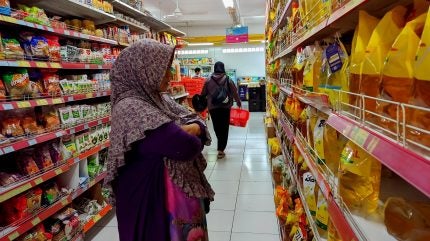
Indonesia’s food and drinks industry is pushing for a delay of a new system of nutrition labels, warning the regulations could have economic repercussions if rushed.
A set of new rules on health include measures aimed at controlling sugar, salt and fat content in processed foods as part of efforts to reduce non-communicable diseases.

Discover B2B Marketing That Performs
Combine business intelligence and editorial excellence to reach engaged professionals across 36 leading media platforms.
Indonesia’s National Agency of Drug and Food Control (BPOM) has released a draft of its Nutri-Level labelling regime to classify food products into four categories – A, B, C, and D – based on their levels of sugar, salt and fat.
Under the agency’s plans, the labels would be used on most packaged food and drink products sold in Indonesia. The labels would be phased in, with ready-to-drink beverages, including liquid concentrates and powdered drinks, being covered first, expected within 18 months of the final approval of the regulations.
Other processed food categories will be included in subsequent stages, except for certain exempted areas such as coffee, tea and spices.
Small and micro businesses will be given more time to comply.

US Tariffs are shifting - will you react or anticipate?
Don’t let policy changes catch you off guard. Stay proactive with real-time data and expert analysis.
By GlobalDataTriyono Prijosoesilo, the chairman of the Association of Indonesian Soft Drink Producers (ASRIM), urged the government to consider further postponing implementation. “We feel that the industry has been minimally involved in this process,” Triyono told Just Food, adding BPOM had held limited consultations with industry.
“There are many questions about the criteria for each category. What exactly do A, B, C, and D actually mean, and why were these thresholds chosen? The lack of explanation has led to uncertainty.”
Triyono stressed ASRIM is also concerned label redesigns would inflate production costs. He said companies seeking a better rating would need time to transition to healthier products, stressing that consumer acceptance is crucial if recipes are changed.
Singapore consulted for ten years before introducing its similar Nutri-Grade system in 2021 “to build consumer awareness, even starting in schools”, he said.
BPOM chairman Taruna Ikrar has insisted the agency is still gathering feedback from companies and consumers.
“The draft regulation has been completed, and we are moving forward with the public consultation process,” he told a news conference late last month.
“We want to ensure the public and industry are well-informed before we make any final decisions.”
The BPOM is mapping the upper and lower food nutrition limits for Nutri-Level standards, he said.
“Our priority is to synchronise the criteria for each level – what constitutes an A, B, and so on. We are also negotiating the grace period for implementation.”
The Indonesian Food and Beverage Producers Association (GAPMMI) has also warned about the potential implications for the industry and the broader economy.
“We hope the government will consider postponing this regulation and work on developing a comprehensive roadmap with stakeholders, including food technology and nutrition experts,” said GAPMMI chairman Adhi Lukman.
“The consequences could be severe, from lost business opportunities to lost livelihoods. The cost to the nation would be too high.”
Under the draft rules, Level A, marked in green, represents the healthiest choice, with the lowest levels of sugar, sodium and fat. Level D – red – represents the highest levels of these ingredients.
Nutri-Level labels will be prominently displayed on the front of food labels, with the specific amounts of sugar, salt and fat noted per serving or per package.
Taruna said the BPOM is assessing the impact of the new labelling system on businesses and exploring potential incentives to support companies.
“Reformulation efforts and other changes will have a significant impact on businesses, so we are taking that into account,” he added.





